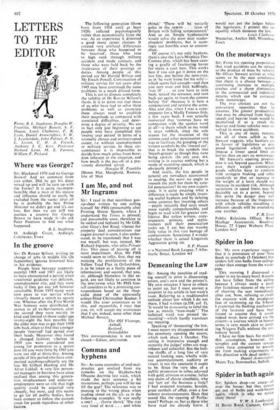On the motorways
Sir: From his opening proposition that road accidents can be related to the product of mass by velocity Mr Oliver Stewart arrives at vs hat seems to be the neat conclusion that there is a choice between a continuing increase in multiple crashes and a sharp diminution in the commercial and industrial returns which can be extracted from motorways.
The two choices are not the convenient opposites that he assumes. The greater productivity that may be obtained from higher speeds and heavier loads would be neutralised if as a result the heavier and faster vehicles were in- volved in more accidents.
This is • one of many reasons. not all of them selfish as Mr Stewart suggests, why hauliers arc in favour of legislation or pro- posed legislation which would impose a lower speed limit on lorries than on cars on motorways.
Mr Stewart's -opening proposi- tion is not beyond question. What- evet their weight commercial goods vehicles have to conform with stringent braking and other standards so that an increase in the weight of a lorry should not increase its accident risk. Although variations in speed limits may be desirable up to a point, beyond this point the danger may well increase because of the frequency with which vehicles travelling at different speeds will be overtaking one another.
F. R. Lyon
Public Relations Officer, Road Haulage Association, Roadway House, 22 Upper Woburn Place, London wcl






































 Previous page
Previous page